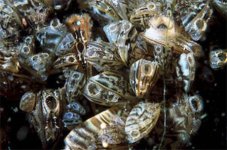Caitlin
Well-known member
From the Iowa Radio News
By O.Kay Henderson
A University of Iowa engineer is trying to help an endangered species survive in the Mississippi River. Earlier this week, five-thousand freshwater mussels that were raised in Minnesota were released into the Mississippi River at Fairport, which is near Muscatine. U-of-I researcher Tatsuaki Nakato says freshwater mussels consume the contaminants in water, so they help clean up the river.
"They are invisible, but work very hard," he says. The greatest danger to freshwater mussels is the zebra mussel. Nakota says there's now a small field of electric current running through the Mississippi, trying to keep the zebra mussels away from the area where these young freshwater mussels were placed.
"So that they will not migrate or drift downstream," Nakato says. Freshwater mussels were nearly wiped out in the late 19th and early 20th centuries by a booming demand for buttons and pearls, then the few left were being displaced by the prolific zebra mussels. The freshwater mussels that were placed in the Mississippi earlier this week are about three years old.
"They raised them under controlled conditions," Nakato says. The "juvenile" mussels were released in an area about 10 feet away from shore, hoping they'd avoid other predators like raccoons and muskrats. The mussels released Tuesday are known as "Higgins Eye" pearly mussels and they're living in an area of the Mississippi that's near a University of Iowa research site and a Department of Natural Resources Fisheries Management Office.
Last edited:

